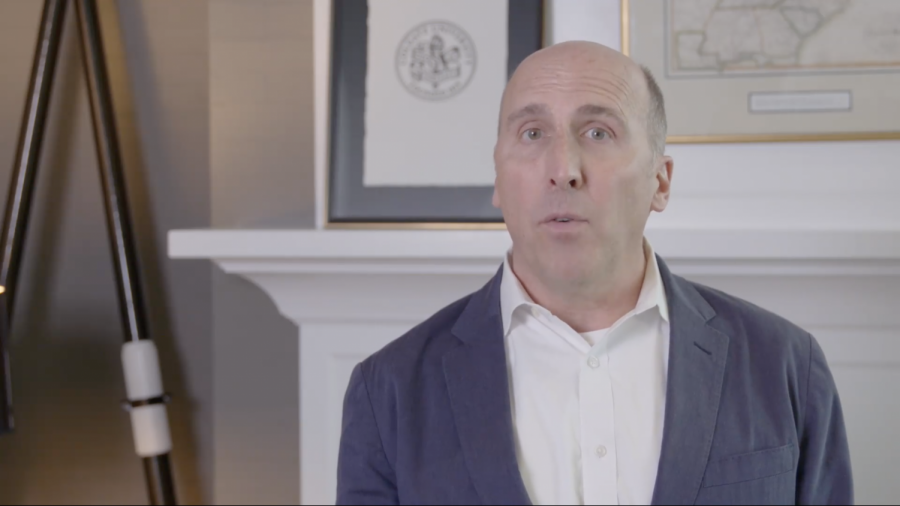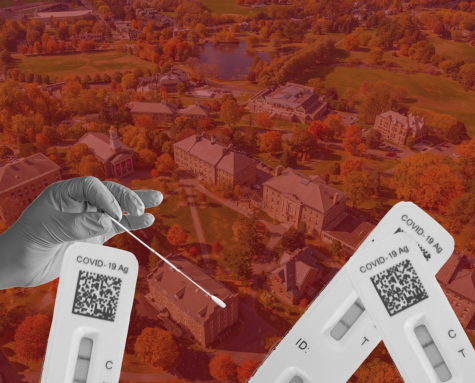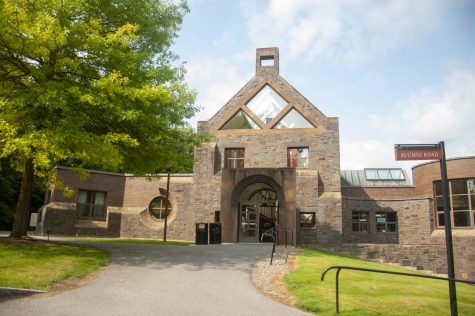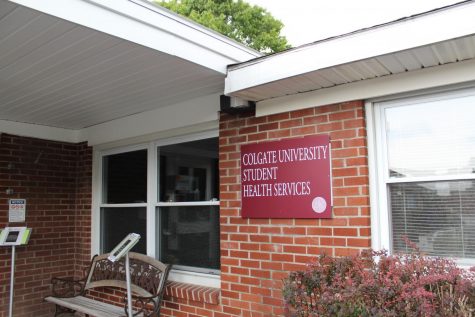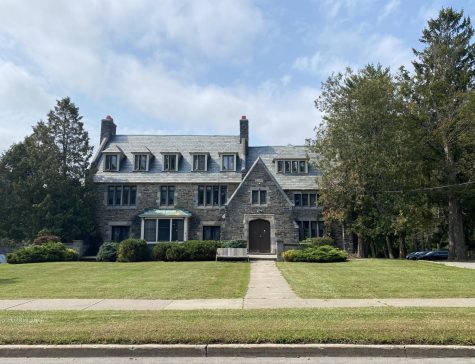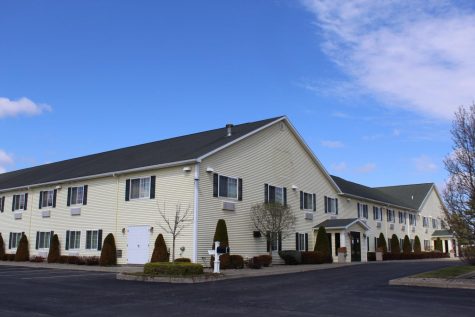University Announces Plans for Fall Return to Campus
After much anticipation by the community following the University’s closure mid-Spring 2020 semester due to the COVID-19 pandemic, President Brian Casey released a video message on June 25 announcing Colgate will reopen campus to the full student body for the fall 2020 semester. Shortly after, the University Task Force on The Reopening of Campus (Task Force) formally released a detailed report for the semester, with guidelines on health, safety, learning and social gatherings. Students will return to Colgate University on the anticipated normal start dates, with first-year students arriving Sunday, Aug. 23 and upperclassmen arriving Thursday, Aug. 27. The plan entails a combination of remote and in-person learning, mandates individuals mask-wearing and provides restrictions on social gatherings.
Although students will be returning to campus on their respective normal start dates, in-person learning will end prior to Thanksgiving Recess, on Nov. 20. Students will then complete eight final days of classes online from Nov. 30 to Dec. 9, and take their final exams remotely, with exams finishing Dec. 18. In-person instruction for Spring 2021 semester will resume in January, with classes beginning Monday, Jan. 25.
According to the report, depending on their level of comfort or potential risks associated with exposure to the virus, faculty will have the option to teach their classes remotely or in-person. Students will also have the option to remain off-campus during the fall semester. The University, the Center for Learning and Technology and the Task Force on Remote Learning are now working to establish alternative models for in-person learning.
Prior to arrival on campus, students must produce a negative SARS-CoV-2 test within 5–10 days of their respective move-in date. If unable to produce a negative test, or experiencing symptoms of COVID-19, students will be asked to delay move in and receive treatment from their primary care physician. In conjunction with regular screening and baseline PCR testing, students will be mandated to self-monitor for symptoms of COVID-19 and will be required to fill out a daily electronic health and symptom questionnaire, both before returning to campus and while on campus. The questionnaire will indicate whether or not a COVID-19 test is recommended and how to obtain testing. A Colgate community contact tracing program will also be in place to ensure the safety of the community and limit exposure, which will be developed by the Colgate Emergency Operations Center (EOC) in collaboration with contact tracing programs organized by the Madison County Board of Health. The EOC has also established a University Health Analytics Team to monitor campus health and safety, as well as to analyze the effectiveness of enforced infection control measures.
Under guidelines for contact tracing, the report contains a recommendation for the EOC to continue exploring Bluetooth-enabled contact tracing phone apps to supplement manual contact tracing, and that this be mandatory for all students, consistent with other guidelines in place to maintain community health. Amidst student concerns, Task Force co-chairs Vice president and Dean of the College Paul McLoughlin and Associate Professor of Biology Geoff Holm hope students would be motivated to use such a service by recognizing that the app would be used only for maintaining health and safety and avoiding campus re-closure.
“Certainly, privacy is an important value, and so the larger question is, when should privacy concerns be modestly impinged upon for the sake of the common collective good? The Task Force recognizes that faculty and students generally want to be back on campus, and the use of app-based contact tracing would give the University its best shot for minimizing transmission, by identifying exposed individuals before they could potentially spread the virus to others,” McLoughlin and Holm said. “The Task Force considered this carefully and were well aware of the national dialogue about safety and privacy. As with other parts of the recommendations that permitted a return to in person instruction, there are a fair amount of changes that we will all need to make to care for one another as well as for ourselves.”
The Task Force report’s guidelines are largely split into two categories, essential actions and recommended actions, with the introduction of a Bluetooth-enabled contact tracing app in the latter. McLoughlin and Holm explained that the essential actions were operationally prioritized from a standpoint of facilitating a safe return to campus, whereas the highly recommended guidelines could be worked upon later once other policies were established.
“The University will continue to put measures in place to further mitigate risk of SARS-CoV-2 transmission on campus throughout the academic year. New public health data and guidance about SARS-CoV-2 transmission and COVID-19 are released by the CDC and public health agencies almost weekly. With this reality, the University may need to move a recommended action to a required one or alter a required one in order to ensure alignment with the best public health data available,” McLoughlin and Holm said.
For indoor spaces such as Huntington Gymnasium and other athletic spaces, where transmission of COVID-19 is high risk, the University is still in the process of developing guidelines pending state regulations. Dining services at Colgate will be required to limit student occupancy, increase sanitation and eliminate self-service. Frank Dining Hall will undergo certain changes such as establishing a grab and go section, having coffee and baked goods located at the front of the dining hall, using Edge Café as an additional venue and offering full meals at each station so as to lessen travel in the servery. In order to further limit crowding, the Theriot Flexible Room (room 565) will be used for additional seating for the Chobani Café and all public upper spaces of the Coop, as well as the Ho Science Center atrium, will become designated dining areas. Furthermore, the Thought Into Action station near the entrance of the Coop will be converted into a grab and go area. Other changes include increasing hours of operation for Donovan’s Pub and creating outdoor seating near all dining venues. The University is exploring options for sustainable reusable containers in order to make food more transportable, using the Hall of Presidents for extra seating, implementing mobile ordering and contactless payment and bringing food trucks onto campus in order to lessen crowds at dining halls during peak periods.
Prior to the start of the semester, each member of the Colgate community will be required to sign and comply with a Community Agreement, aimed at keeping individuals safe, with “clear and serious consequences.” Employees and students will be required to sign separate agreements.
According to McLoughlin and Holm, Colgate community members should ideally be the ones holding each other accountable for policy violations, the natural “clear and serious consequences” of which include the need for quarantine, isolation and, in extreme cases, re-closure of the campus. However, there may also need to be individual consequences, including parent or guardian notification, loss of campus residence, the need to return home, withdrawal from in-person instruction in classes or other sanctions available through the Code of Student Conduct, which would be facilitated through the Dean of the College division.
“Jeopardizing the health and safety of other students is something the student conduct board takes very seriously. Campus Safety, as the name implies, is tasked with providing for students safety and wellbeing, and therefore this department is an important piece of any public health strategy, but will largely not be tasked with policing behavior, except under egregious circumstances,” McLoughlin and Holm said. “Students need to think carefully about whether they can commit to the requirements before they agree to return to campus this fall. Once they do, these expectations are non-negotiable in order to remain on campus in the fall, both individually and collectively.”
The administration and the Task Force came to the conclusion that permitting travel to and from Hamilton for mid-term and Thanksgiving recess, as well as hosting events such as Homecoming and Family Weekend that encourage an increase of visitors on campus, would pose severe risks for transmission and further spread of the virus. Instead, recesses are cancelled and in-person instruction is set to end Friday, Nov. 20, visits to campus by friends and family are discouraged and students are “prohibited from or strongly encouraged” not to bring cars to campus, permitted only to leave campus for approved family emergencies and University organized trips.
McLoughlin and Holm offered clarification on the wording of “prohibited from or strongly encouraged” used in the recommendation for students to not bring cars on campus, saying that although travel outside of the Hamilton area, especially overnight travel, is discouraged, they recognize students may need to make necessary trips, such as to personal physicians.
“So the wording of that recommendation reflects this complex space,” McLoughlin and Holm said. “By and large, it would be great if students didn’t have a car on campus, or, if they needed to, they drove it to Colgate once at the start of the semester, parked it and drove it away at the end of the semester. The use of vehicles as campus transportation is not congruent with the public health imperative of physical distancing and could result in additional students needing to be quarantined or isolated up to 14 days if they are identified as a “close contact” of another student who tests positive for COVID-19.”
Along with Colgate, Skidmore College, a member of the N.Y. Six — the educational consortium of Upstate N.Y. liberal arts institutions, including Colgate — decided to follow a similar plan of having students return to campus and take their courses and final exams online following Thanksgiving Recess. Hamilton College will be conducting a similar module for the end of the semester while offering staggered arrival times, revised orientation and classes on Saturdays and evenings.
The University will host various virtual town hall meetings to further discuss the reopening of campus, including a student/parent forum on Monday, July 6 at 6 p.m, hosted over Zoom by President Brian W. Casey, McLoughlin and Holm. McLoughlin and Holm added that the Task Force’s work is ongoing, outlining procedures and guidance for re-closing and details surrounding necessary University-sponsored travel.
“The Task Force will also be helping the Emergency Operations Center operationalize many of the guidelines that we have recommended,” McLoughlin and Holm said. “Beyond that, we will be constantly monitoring for new scientific and public health information, to revise recommendations to continue to follow best practices for minimizing community transmission. We will also be reviewing real-time health analytics of the campus and responding accordingly.”
NY 6 Decisions
The New York Six Liberal Arts Consortium of which Colgate is a member, is a group of six liberal arts institutions in Upstate N.Y. who collaborate and share resources among each other. As the other members of the consortium are similar in size, mission and geographic character, we have outlined the basic characteristics of the fall semester plans of the other five institutions for comparison.
- Hamilton College
- Early start on Aug. 24 with staggered arrival times and revised orientation from Aug. 20-23, last day of the semester is Nov. 24
- Final exams will be taken remotely
- Some classes on Saturdays and evenings
- Combination of remote and in-person classes
- Early start on Aug. 24 with staggered arrival times and revised orientation from Aug. 20-23, last day of the semester is Nov. 24
- St. Lawrence University
- Offering three semesters, students will enroll in classes for two of the three semesters
- Added summer semester
- Anticipating sophomores and juniors will do enroll in the summer semester, the University is adding opportunities like study abroad to ensure their robust and challenging academic experience continues during the added summer semester
- Students elect to come whichever semesters they prefer, but will assign in the case that numbers aren’t spread evenly
- No more than 1,800 students on campus per semester of 2,411 undergraduates
- Prioritizing first-years, new transfers, and seniors
- Fall break cancelled
- Students are welcome to remain on campus during Thanksgiving Recess, in order to continue in-person instruction. If students do choose to leave campus, they must complete the remainder of the semester remotely
- Combination of remote and in-person classes
- Students will sign a social contract for acting appropriately on campus
- Offering three semesters, students will enroll in classes for two of the three semesters
- Skidmore College
- Early start on Aug. 24 with the end of the semester on Nov. 20
- Final exams will be taken remotely
- Final plan comes out July 2
- 70% of faculty plan to teach in-person
- Early start on Aug. 24 with the end of the semester on Nov. 20
- Union College
- Staff and faculty returning to campus operations
- Final plan not announced
- Plan will adjust as conditions change
- Hobart and William Smith Colleges
- Plan not announced
Nicole Dienst is a senior from Westport, CT, studying English, economics and environmental studies. Prior to serving as Executive Editor, she has held...


